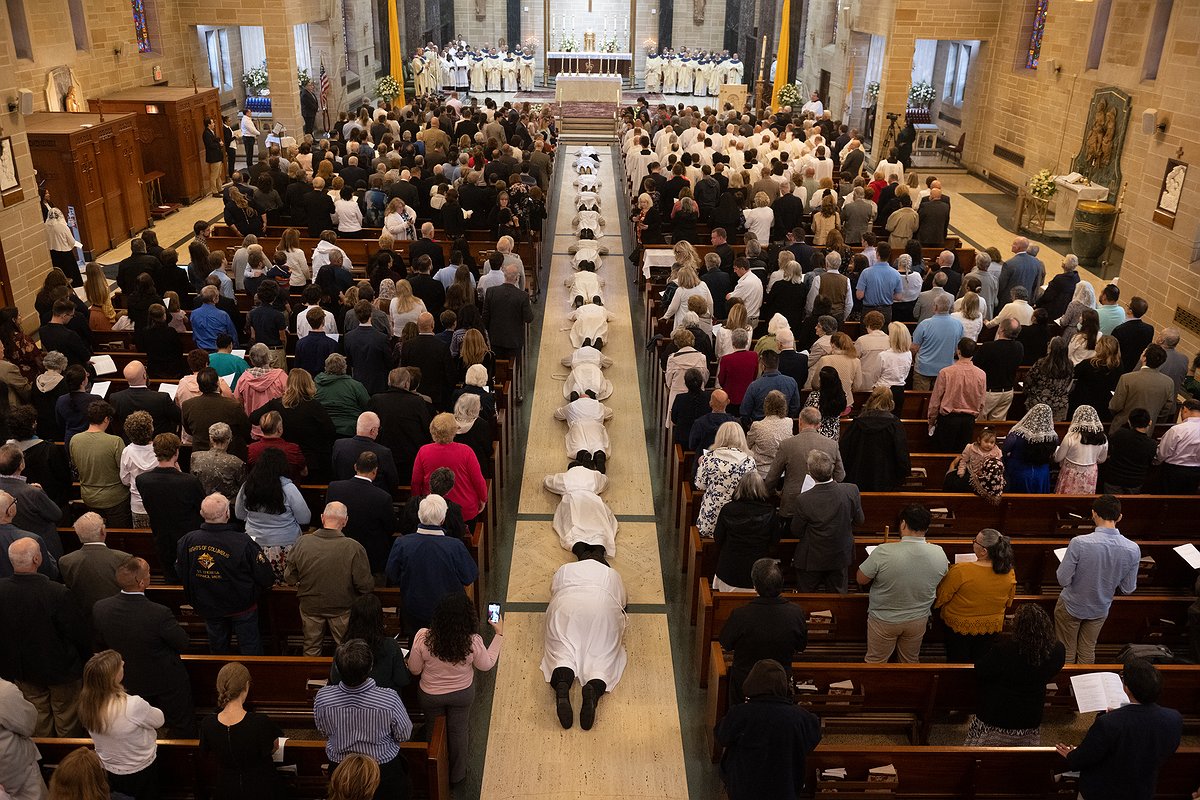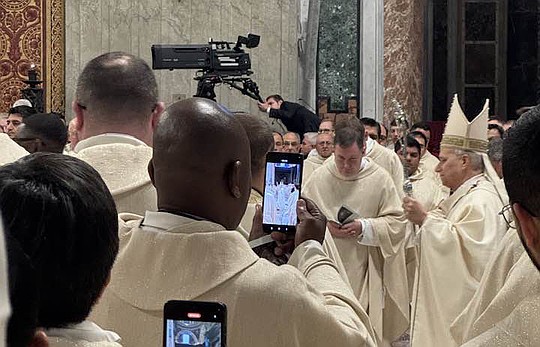Celebrate Deacon Sunday by Celebrating our Deacons
October 6, 2023 at 11:26 a.m.

This weekend, October 7-8, the Diocese of Trenton joins with parishes throughout the country to celebrate the second annual “Deacon Sunday.” Here in our Diocese, there are currently 188 active permanent deacons and 85 retired in our 97 parishes. A deacon is an ordained minister of the Catholic Church and, therefore, a member of its clergy. There are three groups, or "orders," of ordained ministers in the Church: bishops, priests, and deacons. Deacons are ordained by the bishop as a sacramental sign to the Church and to the world of the Lord Jesus Christ, who came "to serve and not to be served." The entire Church is called by Christ to serve, and the deacon, by virtue of his sacramental ordination and through his various ministries, is to be a servant in a servant-Church.  2023 Diaconate Ordination. Jeff Bruno photo
2023 Diaconate Ordination. Jeff Bruno photo
There are two types of deacons in the Catholic Church: transitional deacons or those in the last stage of formation for priesthood and permanent deacons.
The office of deacon originated in the choosing of seven men by the Apostles, among them Stephen, to assist with the charitable work of the early church as recorded in Acts of the Apostles chapter 6. As ministries and numbers grew in the early Church so, too, did the presence of deacons to cooperate in these ministries with bishops and priests.
By around the fifth century, however, the number of deacons participating in a lifelong sacramental office in the Church began to diminish in favor of the diaconate as a “transitional” stage of priestly training. The Council of Trent (1545-1563) restricted ordination to the diaconate to men destined for the priesthood.
Four hundred years later, following the recommendation of the Second Vatican Council (1962-1965) in its Dogmatic Constitution on the Church Lumen Gentium 29, the “permanent diaconate” was restored as an office in the Church through an apostolic letter issued motu proprio by Pope St. Paul VI on June 18, 1967, The Sacred Order of the Diaconate Sacram Diaconatus Ordinem. Although not exclusively so, married been would henceforth be offered this vocational opportunity. There is actually no sacramental difference between permanent and transitional deacons.
Following their acceptance by a diocese, permanent deacons follow an intensive course of theological study and preparation, similar to their transitional counterparts in the seminary, designed to train them for their pastoral and ministerial duties.
Ordained by the bishop for his diocese, permanent deacons are most often assigned by him to parish ministries, customarily the parishes that sponsor their formation. The bishop can, however, assigned them anywhere in his diocese. In the Diocese of Trenton, some parishes do not have permanent deacons and have requested their assignment.
At ordination, permanent deacons promise obedience to the bishop as well as the duty to pray the Liturgy of Hours daily and to live a life in conformity with their sacred office.
All ordained ministers in the Catholic Church are called to the functions of Word, Sacrament, and Charity, but bishops, priests and deacons exercise these functions in various ways. As ministers of Word, deacons proclaim the Gospel, preach, and teach in the name of the Church. As ministers of Sacrament, deacons baptize, lead the faithful in prayer, visit the sick, distribute communion at or after Mass, witness marriages, and conduct wake and funeral services. As ministers of Charity, deacons are leaders in identifying and, through their service, helping to meet the needs of others. But no matter what specific functions a deacon performs, they flow from his sacramental identity. In other words, it is not only WHAT a deacon does, but WHO a deacon is, that should be recognized and affirmed. Deacons can also be and often are a source of wise counsel and advice to pastors and parish committees, drawn from their experience “in the world.”
The Diocese of Trenton is richly blessed by the pastoral and ministerial service of its deacons. We are grateful to them and their families for all that they do. As Bishop, I extend my blessing to them as we celebrate “Deacon Sunday” this year!
A Prayer for Deacons:
O Christ, you are the source of all ministries in the Church. In response to the needs of the People of God, through the laying on of hands and the outpouring of the Holy Spirit, you have called forth and ordained deacons as servants for our Church.
Continue to sustain those You have called to this ministry, so they remain ardent servants with gentle hearts, proclaiming the Gospel and serving at Your Holy table.
Help them reflect the real and true presence of Christ, the Deacon, to the needy among us. We also give thanks for those who accompany these men in their journey of service—their wives and families, their parish communities, and all those who call them to respond in faith, hope, and love.
Loving Savior, continue to help Your Church affirm our deacons in their service. Together as one family of faith, may all that we say and do give honor and glory to You and draw others ever closer to Your Sacred Heart. Amen.
(Prayer by Most Rev. Douglas Lucia, bishop of Syracuse, NY)
Related Stories
Thursday, January 08, 2026
E-Editions
Events
This weekend, October 7-8, the Diocese of Trenton joins with parishes throughout the country to celebrate the second annual “Deacon Sunday.” Here in our Diocese, there are currently 188 active permanent deacons and 85 retired in our 97 parishes. A deacon is an ordained minister of the Catholic Church and, therefore, a member of its clergy. There are three groups, or "orders," of ordained ministers in the Church: bishops, priests, and deacons. Deacons are ordained by the bishop as a sacramental sign to the Church and to the world of the Lord Jesus Christ, who came "to serve and not to be served." The entire Church is called by Christ to serve, and the deacon, by virtue of his sacramental ordination and through his various ministries, is to be a servant in a servant-Church.  2023 Diaconate Ordination. Jeff Bruno photo
2023 Diaconate Ordination. Jeff Bruno photo
There are two types of deacons in the Catholic Church: transitional deacons or those in the last stage of formation for priesthood and permanent deacons.
The office of deacon originated in the choosing of seven men by the Apostles, among them Stephen, to assist with the charitable work of the early church as recorded in Acts of the Apostles chapter 6. As ministries and numbers grew in the early Church so, too, did the presence of deacons to cooperate in these ministries with bishops and priests.
By around the fifth century, however, the number of deacons participating in a lifelong sacramental office in the Church began to diminish in favor of the diaconate as a “transitional” stage of priestly training. The Council of Trent (1545-1563) restricted ordination to the diaconate to men destined for the priesthood.
Four hundred years later, following the recommendation of the Second Vatican Council (1962-1965) in its Dogmatic Constitution on the Church Lumen Gentium 29, the “permanent diaconate” was restored as an office in the Church through an apostolic letter issued motu proprio by Pope St. Paul VI on June 18, 1967, The Sacred Order of the Diaconate Sacram Diaconatus Ordinem. Although not exclusively so, married been would henceforth be offered this vocational opportunity. There is actually no sacramental difference between permanent and transitional deacons.
Following their acceptance by a diocese, permanent deacons follow an intensive course of theological study and preparation, similar to their transitional counterparts in the seminary, designed to train them for their pastoral and ministerial duties.
Ordained by the bishop for his diocese, permanent deacons are most often assigned by him to parish ministries, customarily the parishes that sponsor their formation. The bishop can, however, assigned them anywhere in his diocese. In the Diocese of Trenton, some parishes do not have permanent deacons and have requested their assignment.
At ordination, permanent deacons promise obedience to the bishop as well as the duty to pray the Liturgy of Hours daily and to live a life in conformity with their sacred office.
All ordained ministers in the Catholic Church are called to the functions of Word, Sacrament, and Charity, but bishops, priests and deacons exercise these functions in various ways. As ministers of Word, deacons proclaim the Gospel, preach, and teach in the name of the Church. As ministers of Sacrament, deacons baptize, lead the faithful in prayer, visit the sick, distribute communion at or after Mass, witness marriages, and conduct wake and funeral services. As ministers of Charity, deacons are leaders in identifying and, through their service, helping to meet the needs of others. But no matter what specific functions a deacon performs, they flow from his sacramental identity. In other words, it is not only WHAT a deacon does, but WHO a deacon is, that should be recognized and affirmed. Deacons can also be and often are a source of wise counsel and advice to pastors and parish committees, drawn from their experience “in the world.”
The Diocese of Trenton is richly blessed by the pastoral and ministerial service of its deacons. We are grateful to them and their families for all that they do. As Bishop, I extend my blessing to them as we celebrate “Deacon Sunday” this year!
A Prayer for Deacons:
O Christ, you are the source of all ministries in the Church. In response to the needs of the People of God, through the laying on of hands and the outpouring of the Holy Spirit, you have called forth and ordained deacons as servants for our Church.
Continue to sustain those You have called to this ministry, so they remain ardent servants with gentle hearts, proclaiming the Gospel and serving at Your Holy table.
Help them reflect the real and true presence of Christ, the Deacon, to the needy among us. We also give thanks for those who accompany these men in their journey of service—their wives and families, their parish communities, and all those who call them to respond in faith, hope, and love.
Loving Savior, continue to help Your Church affirm our deacons in their service. Together as one family of faith, may all that we say and do give honor and glory to You and draw others ever closer to Your Sacred Heart. Amen.
(Prayer by Most Rev. Douglas Lucia, bishop of Syracuse, NY)










